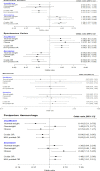Gestational weight gain among pregnant women in Ibadan, Nigeria: Pattern, predictors and pregnancy outcomes
- PMID: 37594997
- PMCID: PMC10437817
- DOI: 10.1371/journal.pone.0290102
Gestational weight gain among pregnant women in Ibadan, Nigeria: Pattern, predictors and pregnancy outcomes
Abstract
Background: Gestational weight gain (GWG) is a risk factor for adverse pregnancy outcomes, future obesity and chronic diseases among women. However, has not received much attention in many low and middle-income countries such as Nigeria. We investigated the pattern, associated factors and pregnancy outcomes of GWG in Ibadan, Nigeria, using the Ibadan Pregnancy Cohort Study (IbPCS).
Methodology: The IbPCS is a multicentre prospective cohort study conducted among 1745 pregnant women recruited from four health facilities in Ibadan, Nigeria. GWG, the primary outcome, was categorised according to the Institute of Medicine's classification into insufficient, adequate and excessive weight gain. Pregnancy outcomes were the secondary outcome variables. Logistic regression analysis (Adjusted odds ratios and 95% confidence interval CI) was used to examine associations, and Poisson regression analyses were used to investigate associations with outcomes.
Results: Only 16.9% of women had optimal GWG, 56.8% had excessive GWG, and 26.9% had insufficient GWG. Excessive GWG was associated with high income '> #20,000-' (AOR: 1.64, 95% CI: 1.25-2.17), being overweight (AOR: 2.12, 95% CI: 1.52-2.95) and obese (AOR: 1.47, 95% CI: 1.02-2.13) after adjusting for confounders. In contrast, increased odds of insufficient GWG have associated women with depression (AOR: 1.70, 95% CI 1.17-2.47). There was no significant association between inappropriate GWG and pregnancy outcomes However, there was an increased odds for postpartum haemorrhage (AOR: 2.44, 95% CI 1.14-5.22) among women with obesity and excessive GWG.
Conclusions: Excessive GWG was the most typical form of GWG among our study participants and was associated with high maternal income, and being overweight or obese. GWG needs to be monitored during antenatal care, and interventions that promote appropriate GWG should be implemented among pregnant women in Nigeria.
Copyright: © 2023 Adeoye et al. This is an open access article distributed under the terms of the Creative Commons Attribution License, which permits unrestricted use, distribution, and reproduction in any medium, provided the original author and source are credited.
Conflict of interest statement
The authors have declared that no competing interests exist.
Figures



Similar articles
-
Patterns and predictors of gestational weight gain in Addis Ababa, Central Ethiopia: a prospective cohort study.Reprod Health. 2021 Jul 28;18(1):159. doi: 10.1186/s12978-021-01202-y. Reprod Health. 2021. PMID: 34321037 Free PMC article.
-
Associations of maternal pre-pregnancy BMI and gestational weight gain with the risks of adverse pregnancy outcomes in Chinese women with gestational diabetes mellitus.BMC Pregnancy Childbirth. 2023 Jun 3;23(1):414. doi: 10.1186/s12884-023-05657-8. BMC Pregnancy Childbirth. 2023. PMID: 37270485 Free PMC article.
-
Prevalence and related factors of inappropriate gestational weight gain among pregnant women with overweight/ obesity in Thailand.BMC Pregnancy Childbirth. 2023 May 5;23(1):319. doi: 10.1186/s12884-023-05635-0. BMC Pregnancy Childbirth. 2023. PMID: 37147586 Free PMC article.
-
Gestational weight gain during the second and third trimesters and adverse pregnancy outcomes, results from a prospective pregnancy cohort in urban Tanzania.Reprod Health. 2022 Jun 16;19(1):140. doi: 10.1186/s12978-022-01441-7. Reprod Health. 2022. PMID: 35710384 Free PMC article. Clinical Trial.
-
Early pregnancy body mass index, gestational weight gain and perinatal outcome in an obstetric population in Lagos, Nigeria.Pan Afr Med J. 2021 Jun 17;39:136. doi: 10.11604/pamj.2021.39.136.25926. eCollection 2021. Pan Afr Med J. 2021. PMID: 34527152 Free PMC article.
Cited by
-
Determinants of weight gain in pregnant women with hyperemesis gravidarum in Dire Dawa administration, Eastern Ethiopia: An unmatched case-control study.Womens Health (Lond). 2025 Jan-Dec;21:17455057251318193. doi: 10.1177/17455057251318193. Epub 2025 Mar 12. Womens Health (Lond). 2025. PMID: 40071992 Free PMC article.
-
Attitudes, Beliefs, and Predictors of Gestational Weight Gain and Postpartum Weight Retention in South Africa: A Mixed Methods Analysis.AIDS Behav. 2025 Mar;29(3):939-951. doi: 10.1007/s10461-024-04577-8. Epub 2024 Dec 30. AIDS Behav. 2025. PMID: 39739279
References
-
- Rasmussen KM, Yaktine ALE. Weight Gain During Pregnancy: Reexamining the Guidelines. Institute of Medicine. In: Rasmussen KM, Yaktine AL, editors. Weight Gain During Pregnancy: Reexamining the Guidelines. Washington (DC): National Academies Press (US) Copyright © 2009, National Academy of Sciences.; 2009. - PubMed
-
- Institute of M, National Research Council Committee to Reexamine IOMPWG. The National Academies Collection: Reports funded by National Institutes of Health. In: Rasmussen KM, Yaktine AL, editors. Weight Gain During Pregnancy: Reexamining the Guidelines. Washington (DC): National Academies Press (US) Copyright © 2009, National Academy of Sciences.; 2009. - PubMed
-
- IOM Committee on Nutritional Status During P, Lactation. Nutrition During Pregnancy: Part I Weight Gain: Part II Nutrient Supplements. Washington (DC): National Academies Press (US) Copyright © 1990 by the National Academy of Sciences.; 1990.
-
- IOM. Weight Gain During Pregnancy: Reexamining the Guidelines. In: Rasmussen KM, Yaktine AL, editors. The National Academies Collection: Reports funded by National Institutes of Health. Washington (DC): National Academies Press (US) Copyright © 2009, National Academy of Sciences.; 2009. - PubMed
Publication types
MeSH terms
Grants and funding
LinkOut - more resources
Full Text Sources

